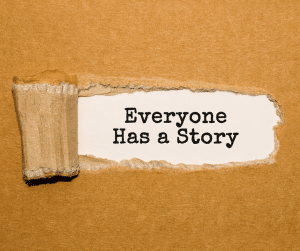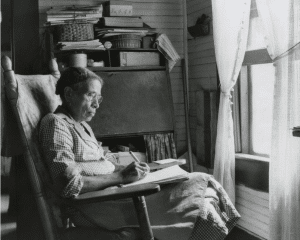Everyone Has a Story, What’s Yours?
Moving into an assisted living or a nursing home is a big change for everybody. Sometimes it can be hard to deal with that change. A lot of elderly struggle with feeling like they no longer have a purpose in life. Boredom, anxiety, and stress can all contribute to health issues. There is a lot of down time that can accompany moving into an assisted living home. And it is during down time that we often reflect on if our life had any meaning. We look back on good times, and on our regrets.
This is why it is imperative for the elderly to share their stories. Research shows that those who actually write down their stories are able to process their lives better. Writing down their stories can give them a feeling of control over their lives and help raise their self-esteem. It can also help those struggling with depression, improve their cognition and improve their behavioral functioning. Having seniors write down their stories is also a great way for these stories to be preserved for the next generation! It can help families come together and sort out issues between family members, by helping them see things from the other person’s perspective.
Storytelling is even a great way to help people who have dementia and Alzheimer’s. If your family member has this, don’t just disregard them if they are constantly rambling about something. A lot of times, the things that are talking about have to do with something in their past. And you might find that they still have lots of memories from a long ago.
Reminiscing is therapeutic. And there are ways that we can help the elderly go through the journey of writing down their lives. Here are some ways that you can help your aging family member:
- Create a list of questions before meeting with them that will ask them about different areas in their life.
- Use a recorder/tape to record the conversation. Nowadays this is even easier because most people have some sort of recording app right on their phones!
- Let them know why you want to know the stories of their lives, who will get to see it, and how it will be used. A great way to use their stories is by making them some sort of scrapbook about their lives with the stories placed in it!
- Be gentle and make sure to have your listening ears on.
- If there is a subject that they don’t feel comfortable sharing, don’t push it. You want this experience to be enjoyable for both of you!
- Make sure you are in an area that is quiet and free from distractions.
- If something isn’t clear, ask questions that will bring clarity.
- Nowadays, there are amazing resources that help seniors write down their stories! Resources on the internet are great! There are free websites that can help people go through the process!
Not only will taking your elderly family through the stories of their lives be beneficial for them and you, it will also be beneficial for their caregivers at their new home. For CNA’s and other healthcare workers, knowing about their client’s stories can help them connect and know how to best take care of your family members. Finding out the elderly’s stories just takes time, patience, and a decision let things slowdown in life. Even if it’s just for a few hours! And that is beneficial for everyone!



